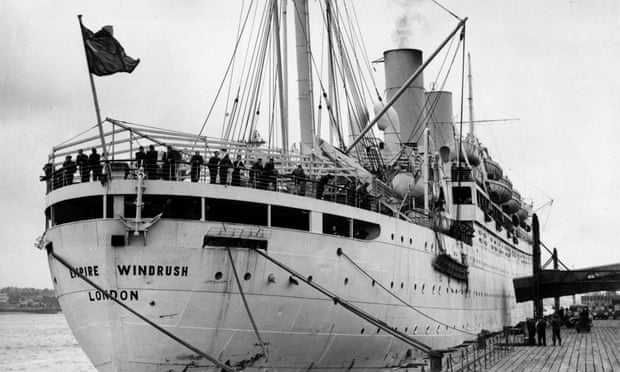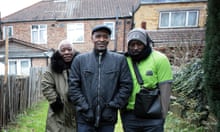Albert Thompson, the Londoner whose case has come to epitomise the Windrush scandal, has spoken of his anguish as he remains uncertain about whether he is to get radiotherapy for his cancer a day after he heard Theresa May announce on television that he would “be receiving the treatment he needs”.
As the fallout from the scandal continued to emerge, Thompson told the Guardian he was distressed to have no clarity, and upset that he had had no apology from the Royal Marsden hospital for the ongoing interruption to his cancer treatment.
Thompson (not his real name) received a brief call on Wednesday night from a consultant at the Royal Marsden telling him that he would receive an appointment letter in “two or three weeks’ time,” and asking him in to come in so he could have some blood tests. He was despondent about the cursory nature of the contact.
“He didn’t mention anything about radiotherapy,” Thompson said, noting that the hospital did not appear to be treating his case as particularly urgent. He remains concerned that despite the commitment from May that he was to receive treatment, the hospital seemed in no hurry to reschedule the 12-week series of daily radiotherapy sessions he was due to start last November, before he was told that he was not eligible for free treatment without proof that he was in the UK legally.
Q&AWhat is the Windrush deportation scandal?
Show

Who are the Windrush generation?
They are people who arrived in the UK after the second world war from Caribbean countries at the invitation of the British government. The first group arrived on the ship MV Empire Windrush in June 1948.
What happened to them?
An estimated 50,000 people faced the risk of deportation if they had never formalised their residency status and did not have the required documentation to prove it.
Why now?
It stems from a policy, set out by Theresa May when she was home secretary, to make the UK 'a really hostile environment for illegal immigrants'. It requires employers, NHS staff, private landlords and other bodies to demand evidence of people’s citizenship or immigration status.
Why do they not have the correct paperwork and status?
Some children, often travelling on their parents’ passports, were never formally naturalised and many moved to the UK before the countries in which they were born became independent, so they assumed they were British. In some cases, they did not apply for passports. The Home Office did not keep a record of people entering the country and granted leave to remain, which was conferred on anyone living continuously in the country since before 1 January 1973.
What did the government try and do to resolve the problem?
A Home Office team was set up to ensure Commonwealth-born long-term UK residents would no longer find themselves classified as being in the UK illegally. But a month after one minister promised the cases would be resolved within two weeks, many remained destitute. In November 2018 home secretary Sajid Javid revealed that at least 11 Britons who had been wrongly deported had died. In April 2019 the government agreed to pay up to £200m in compensation.
By the end of 2020, victims were describing the long waits and 'abysmal' payouts with the scheme, and the most senior black Home Office employee in the team responsible for the Windrush compensation scheme resigned, describing it as systemically racist and unfit for purpose.
The call he had from the hospital is only the second contact he has had from his cancer specialist since he was told he needed to pay £54,000 if he wanted to go ahead with treatment (a sum he was, naturally, unable to raise). The phone conversation lasted three or four minutes, he thinks, and he had no chance to ask questions about what was going to happen next, or for professional reassurance about his fears about his health. The earlier call was equally brief, he said.
His unease over his suspended treatment came as the scale of the Windrush scandal continued to grow, as a flood of new cases emerged of lives ruined by the brutal application of the prime minister’s “hostile environment” policy towards a group of people who have lived in the UK legally for over half a century. The Home Office’s new Windrush hotline has had 232 calls since it was launched on Monday.
Thompson, 63, moved to London as a teenager 44 years ago to join his mother, who was here working as a nurse. Despite tax and national insurance records going back decades, he is still struggling to prove that he has the right to be here. He has never had a British passport, was not aware he needed one, and assumed he was British until suspicion over his immigration status led to him being evicted from his council-owned accommodation last year.
Even though his case exemplifies the difficulties experienced by this cohort of people, a technicality means that Thompson does not qualify as a Windrush person, eligible for assistance under the government’s new schemes announced this week, as Theresa May pointed out as she responded to questions about him in the Commons on Wednesday. He arrived a few months after the 1973 Immigration Act was implemented.
Thompson’s lawyer Jeremy Bloom described his client’s treatment as “grossly unfair”. “Albert has still not received any clear communication, either verbally or in writing, that sets out exactly what treatment he can expect to receive and when. His clinicians first discussed the possibility of radiotherapy treatment with Albert in November 2016. He was told that it would start in November 2017. Nothing that the hospital have said since the PM’s announcement has clarified whether or when he will be receiving the radiotherapy treatment that he requires,” Bloom, of Duncan Lewis solicitors, said.
“It is grossly unfair that someone in Albert’s position, who can demonstrate that he has been resident in the UK for 44 years, should have to demonstrate that he has Indefinite Leave to Remain before the hospital can provide him with treatment that they have previously decided is necessary.”
Thompson was trying to be upbeat: “The prime minister said I would get treatment, so I presume it is true, but I won’t believe it until I get the go-ahead for the treatment,” he said. He was enraged at the revelation that the Home Office had destroyed Windrush landing papers in 2010, and suspected that the disappearance of these records might have complicated his attempts to get evidence of his long stay in the UK.
He said he had repeatedly visited the Home Office in an attempt to sort out his difficulties. “They can’t find any trace of me at all. That’s not my fault – they need to sort that out,” he said.
A spokesperson for the Royal Marsden hospital said: “Mr Thompson’s cancer specialist is arranging for Mr Thompson to come into the clinic for the next stage of his NHS treatment.”
The Commonwealth heads of government meeting was entirely overshadowed by the unfolding scandal. In a joint statement, the high commissioners for Barbados and St Kitts and Nevis, the primary advocates for the Caribbean on this matter, said that the home secretary Amber Rudd had indicated “acute awareness of the need for urgency” in a meeting with the Caribbean leaders, and hoped the issue could be resolved.
Keith Mitchell, the prime minister of Grenada, was more pessimistic. He said the use of the phrase “hostile environment” with regard to immigrants “doesn’t feel good”. “I think we have been making the point that Britain, being our former colonial masters, have not necessarily treated us in the postcolonial period in the way we expected,” he told the BBC.
Q&AHave you been affected by this story?
Show
If you have been affected by this story, you can share your experiences with us by
using our encrypted form, here.
Your
responses will only be seen by the Guardian and we will treat them
confidentially. Your stories will help our journalists have a more
complete picture of
these events and we will feature some of them in our reporting.
Many Windrush people contacted the Guardian to tell their stories, including an 89-year-old ex-bus conductor who described how in 2017 he went on holiday to Grenada (a country he left in 1957), and was told he could not return to the UK, where he had lived for 60 years because he had no proof of his right to reside. He is still trying to untangle his immigration problems. “When the Windrush scandal broke, I couldn’t believe what I was reading and hearing. I thought I was an unusual case,” he said. Others told disturbing stories of how they had lost jobs and homes and been asked to pay for hospital treatment as a result of their difficulties persuading officials that they were not in the UK illegally.
Meanwhile, immigration case workers voiced profound concern about the Home Office’s new Windrush hotline, which is manned by untrained call processors, and which requires individuals to hand over all their personal details before they can get any advice.
Gail Lyle, manager of the Citizens Advice immigration service in Bolton, with 15 years of immigration casework experience, tried calling the helpline on behalf of a client who came to the UK from Barbados aged 10, in 1965, and who was recently suspended from his job because he had no papers. She said he was nervous about giving all his personal details to the service without clear reassurances that if he was not found to have legal status here, for whatever technical reason, his details would not then be sent to the UKBA for removal purposes.
The Home Office needed to understand that “our clients are out of the blue losing their homes and being told they can no longer work, therefore they are a bit reluctant to give all their personal details to the department that’s doing this”, Lyle said.
Case workers from the Joint Council for the Welfare of Immigrants were also concerned about the hotline, and fact that it was not possible for applicants to get discreet, anonymous advice. “The helpline doesn’t work, doesn’t show any sensitivity or knowledge,” Satbir Singh, CEO of the charity, said.
“The JCWI caseworker asked the person manning the phones: ‘How does somebody from the Windrush generation get their status regularised?’ The helpline worker replied: ‘Just apply as normal.’ The caseworker then asked, ‘What does somebody need to apply?’ The response was: ‘Go to the website. It’s got more information than I have,’” Singh said.
The Home Office said: “Those who call our helpline will not have their details passed on for enforcement activity.”








